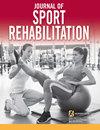术前康复可提高前十字韧带损伤者的身心健康:混合方法研究。
IF 1.3
4区 医学
Q3 REHABILITATION
引用次数: 0
摘要
前交叉韧带损伤后的康复治疗建议在损伤后尽快开始。当需要进行手术时,研究支持在前交叉韧带重建(康复前)前进行物理治疗,以优化恢复并取得积极效果。参加康复前治疗的患者从未接受过关于他们是否坚持康复前治疗、对满足需求的效用的看法、即将发生的事件或预期康复目标的调查:方法:对前交叉韧带重建前的 25 名患者(占分娩期 12 家诊所合格患者的 43%)进行了心态和康复预期调查。结果:参与者表示,在治疗过程的这一阶段,防止再次受伤(96% 的回答)和在日常活动中对自己的膝关节感到自信(92%)是较高的期望值。访谈和分析得出了三个主题。(1) 参与者表示,康复前是一个充满挑战的时期,有受伤的记忆和不确定性。(2) 他们认为康复前是通过寻找支持和自我激励向前迈进的一步。(3) 他们相信康复前训练会对治疗效果产生积极影响。结论参加者对康复前训练有积极的体验,这与现有文献中关于康复前训练功能结果的研究结果一致。本文章由计算机程序翻译,如有差异,请以英文原文为准。
Preoperative Rehabilitation Enhances Mental and Physical Well-Being in Anterior Cruciate Ligament-Injured Individuals: A Mixed Methods Study.
CONTEXT
Rehabilitation after an anterior cruciate ligament injury is recommended to be started soon after the injury. When surgery is required, research supports the delivery of physiotherapy before anterior cruciate ligament reconstruction (prehabilitation) to optimize recovery and positive outcomes. Individuals attending prehabilitation have never been questioned regarding their adherence to prehabilitation, perception of utility in meeting needs, upcoming events, or anticipated recovery goals.
DESIGN
Mixed methods cross-sectional study: Methods: 25 individuals before anterior cruciate ligament reconstruction (43% of eligible individuals from 12 clinics during the delivery period) were surveyed on their mindset and recovery expectancies. Semistructured interviews conducted in 9 of 25 participants assessed their lived experience of prehabilitation.
RESULTS
Participants reported that preventing a reinjury (96% of responses) and feeling confident during daily activities about their knee (92%) were the higher rating expectations at this stage of their treatment course. Three themes were developed from the interviews and analyses. (1) Participants reported that prehabilitation was a period full of challenges with memories of the injury and uncertainties. (2) They viewed prehabilitation as a step to move forward by finding support and self-motivating. (3) They believed that prehabilitation would have positive impacts on the treatment outcomes. Participants were confident that prehabilitation would accelerate the recovery of muscle volume (88%) and strength (84%).
CONCLUSION
Participants had positive experiences of prehabilitation, aligning with the findings on functional outcomes in the existing literature on prehabilitation.
求助全文
通过发布文献求助,成功后即可免费获取论文全文。
去求助
来源期刊

Journal of Sport Rehabilitation
医学-康复医学
CiteScore
3.20
自引率
5.90%
发文量
143
审稿时长
>12 weeks
期刊介绍:
The Journal of Sport Rehabilitation (JSR) is your source for the latest peer-reviewed research in the field of sport rehabilitation. All members of the sports-medicine team will benefit from the wealth of important information in each issue. JSR is completely devoted to the rehabilitation of sport and exercise injuries, regardless of the age, gender, sport ability, level of fitness, or health status of the participant.
JSR publishes peer-reviewed original research, systematic reviews/meta-analyses, critically appraised topics (CATs), case studies/series, and technical reports that directly affect the management and rehabilitation of injuries incurred during sport-related activities, irrespective of the individual’s age, gender, sport ability, level of fitness, or health status. The journal is intended to provide an international, multidisciplinary forum to serve the needs of all members of the sports medicine team, including athletic trainers/therapists, sport physical therapists/physiotherapists, sports medicine physicians, and other health care and medical professionals.
 求助内容:
求助内容: 应助结果提醒方式:
应助结果提醒方式:


